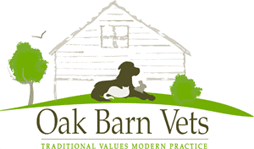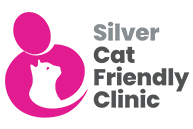This month’s caseload has been a little unusual, in part due to the large number of hopping and burrowing patients that we have cared for. Certainly here at Oak Barn Vets rabbit numbers seem to be on the up (well you know what they say about rabbits!!).
Sadly the reason behind this fact is not a happy one as the vast majority of rabbits that we have seen have been those which have been given up by their owners and taken on by the RSPCA. This is often due to poor care, overcrowding or neglect. The RSPCA and their fosterers work hard and do a fantastic job rehabilitating these rabbits to ensure they are fit and well to go on and be re-homed.
So rather than a single “case of the month” for February we have chosen to discuss some of the specific needs of rabbits and how they can become a rewarding and loving family pet.
The common perception that rabbits live in a hutch and eat carrots is a far cry from their natural lifestyle. Rabbits are adapted to life in open areas of scrub and grassland in large social groups. They spend a huge proportion of the day grazing on low nutrient fibre diets. Energy is spent digging and maintaining burrows and defending their territory as well as watching for possible threats.
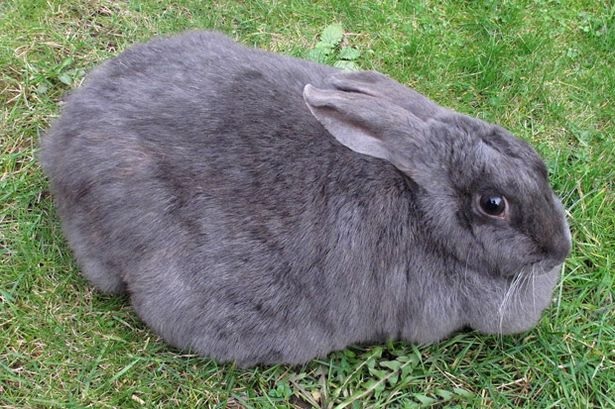 The greatest health problem we encounter with rabbits is that of obesity. This is generally a consequence of lack of activity and an inappropriate diet. A rabbit’s digestive tract is developed to process a near constant supply of high fibre foods (ie grass), therefore feeding a pet rabbit a mixed diet of cereals and high sugar treats is a fast track to becoming overweight.
The greatest health problem we encounter with rabbits is that of obesity. This is generally a consequence of lack of activity and an inappropriate diet. A rabbit’s digestive tract is developed to process a near constant supply of high fibre foods (ie grass), therefore feeding a pet rabbit a mixed diet of cereals and high sugar treats is a fast track to becoming overweight.
As you can see this rabbit in this photograph is carrying too much weight but what you can't appreciate is how much damage that is doing on the inside. Spaying girls this size is not easy and carries risks of increase length of anaesthesia and intraoperative haemorrhage. The photo below shows how much fat encases the female reproductive tract in these large bunnies compared to a normal spay opposite in a healthy slim rabbit
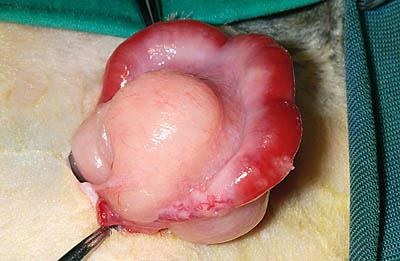
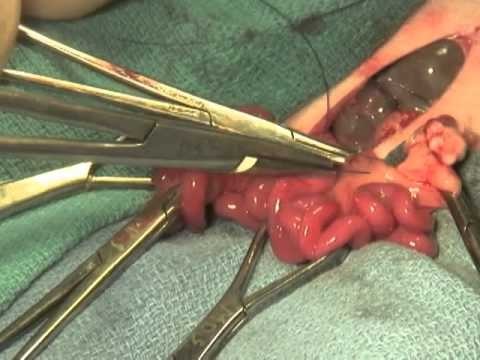
Rabbit’s teeth are also designed for a grazing diet and they grow continuously through their life. If they do not eat high fibre diets with lots of chewing then the teeth do not wear down. This problem is further compounded by high cereal diets which cause bone weakness around the tooth roots resulting in wonky teeth that just keep growing. As you can imagine this is very uncomfortable for the rabbit and can lead to life threatening infections.
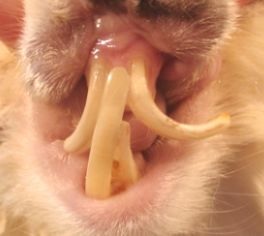
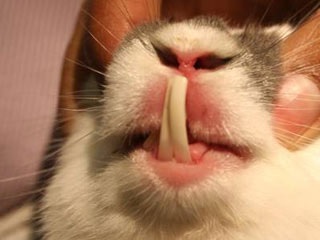
We have found many of the rescue rabbits coming in to Oak barn Vets for procedures will often have dental disease, even at quite a young age, which has most likely come about through inappropriate diets.
Most of the rabbits we have seen this month have been undergoing neutering procedures, either castration for the bucks or spaying (ovariohysterectomy) for the does. Female rabbits have a very high incidence of cancer involving their reproductive tract so surgical spaying becomes very important in helping to prevent this illness.
As rabbits are such social animals then in general they cope better when living alongside other rabbits, often creating very strong bonds. Neutering allows bonding between different sex rabbits without the risks of unwanted pregnancy and also reduces risks of fighting and territorial behaviour.
A number of precautions are taken when anaesthetising rabbits for surgery due to their sensitivity to stress and pain. Historically in the veterinary world rabbits have always been thought of as high risk anaesthetic patients. At Oak Barn Vets all our rabbits receive fluids and pain relief before their procedure and much like our dogs and cats once asleep they will have a tube placed to maintain their airway and to provide oxygen and anaesthetic gas. All of our bunnies will have dissolvable sutures hidden under the skin so there is nothing to nibble at once home! Thankfully due to these careful considerations our rabbits have very few problems with anaesthetics.
Rabbits re-homed through the RSPCA will undergo a full health check including oral examination, neutering if required and vaccination against myxomatosis and viral haemmorhagic disease, both potentially fatal conditions in wild and domestic rabbits. Having undergone these procedures, as well as potentially being bonded with another suitable partner, the healthy rabbits are able to be rehomed.
If you think you could offer a happy forever home the RSPCA would be very glad to hear from you or let us know at the practice and we can put you in touch.
